January 4, 1902
Is football what it was 10 years ago? By William McGregor (founder of the Football League).
Go where you will in football circles, you are constantly met with the querulous complaint, “Ah, football isn’t what it used to be.”
It is the privilege of the ex-player and the elderly spectator to live in the past; the past contains all that was the best of their lives, and the future will bring nothing but old age and increasing infirmities.
But it is given to some of us to keep our minds free from cant. The good old times were very bad old times; there has never been a more comfortable time for the average person than the present.
The good old times may have been all very well for the lordly being who called his dependents vassals, and minions, and caitiffs, and consigned them to the deepest dungeon beneath the castle moat, but they were anything but good times for the aforesaid vassals, minions, and caitiffs who spent their spare time in dungeons which were not regularly visited by the sanitary inspector.
My own idea is that we get most things as good as we used to get them, and some of them a great deal better.
I have no great sympathy, therefore, with the football pessimist. I was greatly struck by some remarks on a similar subject made by James Crabtree, a man whose opinions are always sound and well voiced. His idea is that cohesion in defence now nips individual skill in the bud; he suggests that our best footballers possess as much skill as those of the past, but do not get the chance of displaying it in ornate a fashion as their predecessors did.
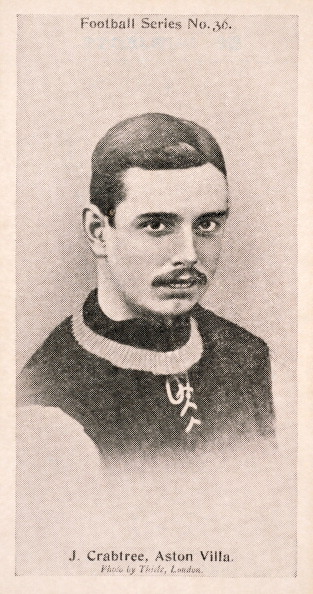
There is such a perfect understanding between the halves and backs, that the lot of the present day forward is anything but an enviable one.
10 years ago
Crabtree has hit the nail on the head there. Present-day football is not so picturesque as it was. We do not get such thrilling individual feats as we used to see in the days of William Nevill Cobbold, and, ten years ago, in the times of John Middleton Campbell and Dennis Hodgetts, of Latta and W.I. Bassett, Tinsley Lindley and Fred Geary.
Ten years ago, in addition to the above-mentioned experts, we had John Southworth, Edgar Chadwick, and A. Milward.
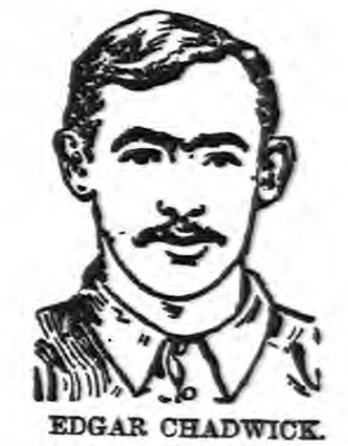
The, going outside the ranks of purely English players, Sunderland were at their best, and North End still retained a great measure of their old skill, and were able to run second in the League in the two seasons following those in which there were actually successful.
We all know how talented the Sunderland and North End players of that day were. We have never had finer football than the teams of that period showed.
Skill, pure and undiluted, gained for the clubs the preeminence they enjoyed. We may never see anything quite so fine as the subtle combination of North End and Sunderland, for the simple reason that players are more scattered to-day than ever they were.
The really good elevens of that day could almost be counted upon the fingers of a single hand. Even at that time the process of disintegration was beginning to set in, but it had not done its work.
Let us take a glance at the football of ten years ago, and see where the leading players were located. There was not a single club of really good standing in the South, the Corinthians excepted. The Old Carthusians had a good side, but they were not a great power in football, as the Corinthians absorbed their best men for all their principal engagements.
Charterhouse v Old Carthusians, 1892.

Southern football was almost at its lowest ebb, for the slump – the relative slump – which had set in simultaneously with the expansion of the game in the Provinces, was still in operation pending the conversion of the South to professionalism.
Portsmouth, Southampton, and Tottenham Hotspur were purely local organisations. The Old Boys’ teams never troubled to play outside the Metropolis, so that but for the Corinthians there would have been no connection between the North and South. Inter-association matches had to a large extent died out, and there was no great amount of touring done.
The League dominated everything.
In the North, Everton had won the League Championship in 1890-91, with Preston North End second, and Wolverhampton Wanderers and Notts County (equal) third. That was Aston Villa’s worst season; they only made 18 points as against 29 by the winners, and were in the last four of the competition.
Everton, 1890-91.
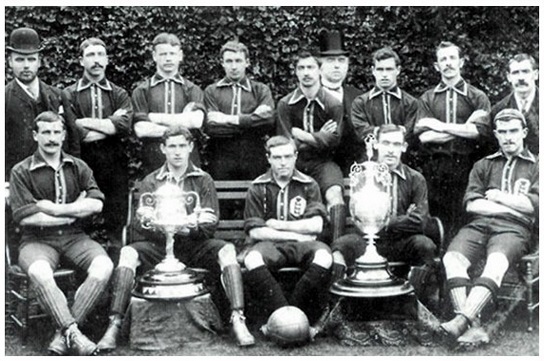
In 1891-92, Sunderland, whose second year in the tournament it was, were at the head of the table with the splendid aggregate of 42 points (there were two additional clubs that year). Sunderland had only been included in the League in the previous season, and did not during that year find their feet.
Everyone knew what a brilliant team they were, but, somehow or other, they could not win matches, and that is the only criterion of ability that the League table recognises. North End (37) were again second in 1891-92; Bolton Wanderers (36) being third, onlye one point behind the erstwhile champions, and Aston Villa (30) were an indifferent fourth.
Bolton Wanderers were a very fine team at that time. Those were the days of Kenny Davenport and James Brogan, and the Wanderers were a hard team to beat in any phase of football.
James Brogan, Bolton Wanderers (Lloyd’s Weekly News: November 15, 1891):
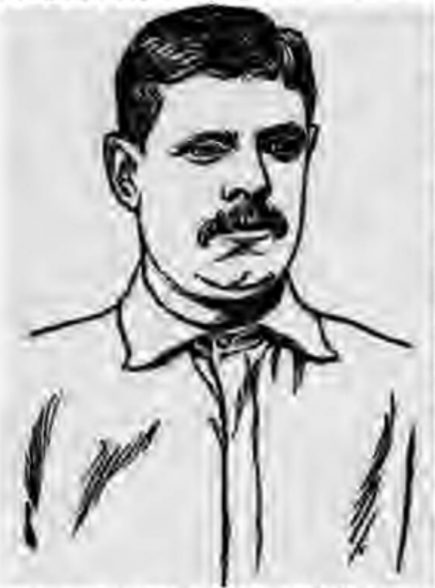
Accrington and Darwen were then in the League, and, with the Albion, had rather lowly positions, for the Albion never did themselves full justice in League football until the present season.
At the parting of the ways
Ten years ago, therefore, we stood at the parting of the ways. The two or three teams which had been collected together by very competent judges from all quarters of the United Kingdom (Bolton Wanderers were always a particularly heterogeneous lot) were at their best, and other clubs, if they had begun to covet their players, had devised no means of weaning them from the allegiance to the great organisations to which they were naturally proud to belong.
The South had no ambition; all the effective football was played by a handful of teams in the North and Midlands. But gates were steadily growing, and men of substance were behind many of the leading League elevens.
They were men who could afford to risk money in the furtherance of a particular hobby; I suppose the man who was at the back of Sunderland, Mr. Tyzack, was as nearly as possible a millionaire, if not actually such.
But other team had their Tyzacks, and the talented players who had been grouped together in a few privileged clubs began to get scattered all over the North and the Midlands.
The recruits obtained by North End were not equal to the men whose places they filled, and so the greatest team on the earth gradually lost caste until they drained the dregs of the cup of humiliation last year by losing their position in the League, the pride and glory of which they had once been.
The football of ten years ago was undoubtedly more attractive than the game of to-day. In the North End team every man was a star; he was, in fact, almost the best of his kind to be found in the whole country.
How many men would Mr. Sudell have dropped had he had the whole country open to him to pick how and where he liked?
We venture to say that at the time North End were in the zenith of their fame he would not have discarded more than three of his eleven at the most.
Sunderland had one or two comparatively moderate men, but you could not have bettered the bulk of the positions.
How many League teams are there to-day about which you could say, “No, I scarcely think it would be possible to materially improve this team.” Why some of our League elevens have a very large leaven of men that North End, Sunderland, and Everton of ten years ago would not have looked at.
Wanted: More high class players
The truth is that we have not enough really high-class players to go all round. That is a plain statement of the facts of the case. Clubs want good men and are willing to pay for them, but they are not to be had.
There has been a boom in professionalism in Scotland which has meant the cutting off of the supplies of good young recruits from that quarter, and while supplies have never been shorter, the demand is excessive.
We have all the leading clubs in the South clamouring for reinforcement of talent, for although some of my good friends in the South are deservedly proud of their best organisations, they will readily acknowledge the debt they owe to the North if they take the trouble to study the antecedents of the men who have built up the fame of Tottenham Hotspur, Portsmouth, Southampton, Woolwich Arsenal, and Bristol City.
Native professional talent has not done much for Southern elevens, but then that is not surprising, for native Southern talent has not yet had time to develop.
There never will be the time again in which it will be possible to find eight out of the eleven best players in one team. Even our strongest elevens – our very strongest – are not without men of moderate ability.
There are a couple of moderate men at least (if not three) in Aston Villa team, and Everton and Sunderland would easily be able to strengthen their eleven if they had ready access to men outside their ranks.
Dash v. Science
I am afraid that some of our club executives have not gone out of their way to make their teams unduly artistic. It was quite a fashion a short time ago to sneer at pretty football, and to decry everything which had not in it a flavor of vigour and dash.
Aston Villa acquired five men from Millwall mainly because the Dockers had beaten them once by the exercise of that mysterious quality known as dash. Dash is very useful, but it has not done so much to popularize football as skill and versatility.
Even to-day, after several years of close attention to the cultivation of dash, the leading teams are those which pay most attention to the science of the game. I am afraid that dash might often be legitimately spelled “bash,” and I am no great admirer of bashing elevens.
I should say that never since football was a rough-and-tumble game have accidents been more numerous than they are to-day, and this win-at-any-price spirit which teams display, and which, I am afraid, many directors encourage, will not do the pastime any good.
While I am in no sense disposed to be pessimistic, I am quite convinced that we do not see so many thoroughly good games at Aston as we used to see on the old Perry Barr ground.
You never see a wing-pair as clever to-day as Chadwick and Milward were. It may be that the halves and backs will not allow a clever wing pair to do as they like, but it is difficult to keep clever couple in check. You can deal with one smart forward, but a couple will often play havoc with the cleverest defence.
Standard of the play better than ever
There is no clean and skillful passing of the kind we used to see ten year ago from a few of the cleverest teams. But this superlative skill was only exhibited by a few clubs; it was not the possession of the many, it was the monopoly of the few.
Taking the number of good teams there are to-day into consideration, the play is the better, that is. It is impossible for any club to retain more than its fair share of the best men; you will find clever fellows in every team.
I have been amazed at the skill exhibited by quite junior clubs – lads’ teams – in the Birmingham district, and I have no doubt the same remark would apply to clubs in other districts.
When one takes this into account, and also remembers that he greatest development of late has been in the direction of combination in defence, you can see why the apparent falling-off in the excellence of forward play should appeal to those who judge the game in a rather superficial way.
The falling-off, however, has been more apparent than real. Good forwards still want a great deal of pulling up, and good backs are not easily passed.
Liverpool, 1892-93.
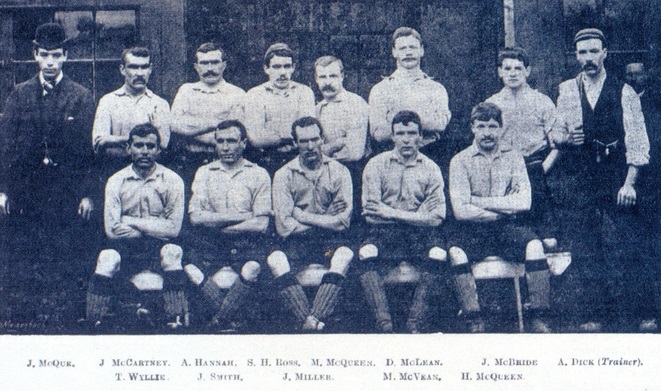
And so it will probably be to the end of the chanter. When we have had the reaction from this desire to see “vigorous” teams, we shall probably get as good football as ever we had, speaking broadly; I am afraid the days of North End and Sunderland cannot be expected to recur. But do not let us speak too slightingly of the present merely because we are justifiably proud of the past.
(Lancashire Evening Post: January 4, 1902)
